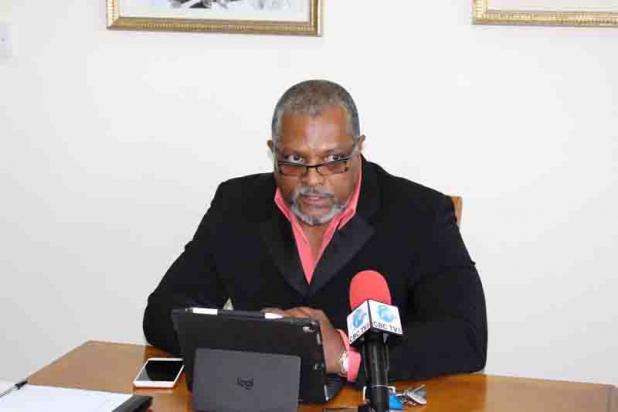
Minister of Agriculture and Food Security, Indar Weir.
Date announced
This year’s sugar harvest will start tomorrow, February 24 and if all goes well, 93 000 tonnes of sugar cane are expected to be sent to the factory, which should yield close to 9000 tonnes of sugar, just about a 1000 tonnes more than last year.
The announcement was made yesterday during a press conference at the Ministry of Agriculture and Food Security. Additionally, Minister of Agriculture, Indar Weir, disclosed that the lone factory at Portvale has already done its steam trials and is ready to go and all the concerns of the staff of that factory as well as the farmers have been addressed. This, he stated, includes the matter of monies owned to the farmers, who have agreed to now accept $150 per tonne, instead of the customary $160 per tonne.
He told the media that tomorrow’s start is in keeping with his aim to start the harvest early, and is being made possible by the efforts of the Barbados Workers’ Union, the Barbados Sugar Industries Limited (BSIL) and the Barbados Agricultural Management Company (BAMC), all of which were represented at the press conference.
Weir’s remarks came as he said that he is concerned about the sugar industry, which he lamented has not only been declining as it relates to yields, but also in respect of the husbandry practices that are employed by the BAMC and the private farmers. In both respects, he said, those practices are way below acceptable levels. As such, he stated they have agreed that this can no longer be the case and will be taking steps to address it.
“I found a situation where they were not putting fertilisers in the field, either because they couldn’t afford to do so, or that by the time they were able to purchase fertiliser it was too late and you would have wasted the fertiliser. I came at a time when they could not practice good husbandry because they didn’t have the money to be able to buy the herbicides and pesticides that were needed. These are the variables that have tormented this industry. Apart from that we have had to fight and mitigate climate change where we got more droughts; as a matter of fact 2019 was touted to be the driest year in many, many, many decades,” he said.
Minister Weir indicated that Government appreciates how the failure to pay the sugar farmers on time has affected the industry, and as such, has cleared the debt owed to the private farmers which he said is expected to improve the operations on the various farms. Likewise, he spoke to the cowitch problem, indicating that Government has given its commitment to the union to get rid of the pesky plant, but made it clear that could not be achieved overnight.
“I have asked the Deputy General Secretary [of the Barbados Workers Union] to nominate someone who would serve on a steering committee within the BAMC which would be a joint committee with the BAMC and the BSIL, so that we start a process of monitoring and evaluation... We have also agreed that because you cannot ask people to go and work with cowitch and not be compensated for the risk involved, that we have agreed to an increase for those persons... we have also agreed that it would happen at the factory as well as in the field,” he said.
Meanwhile, agricultural officer at the BAMC, Anderson Eversley said that 14 tipping trailers have been imported from Guatemala and are in the process of being delivered to various stakeholders within the BSIL group. He said the tipping trailers, which cost around $1.2 million, are expected to enhance field transport in terms of getting the canes to the 20-tonne trailer trucks to be transported to the factory. He said they anticipate that the turnaround time from the field to the factory would be reduced and make for improved operations all round.
Adding to his comments, Minister Weir said that the trans-loading stations will be phased out, to bring about further efficiencies in the industry.
(JRT)
